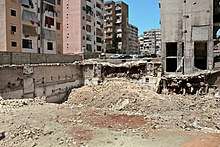Dahieh
Dahieh, Beirut (Arabic: الضاحية الجنوبية al-Janubiya, French: Banlieue Sud de Beyrouth, Dâhiye de Beyrouth, meaning "the southern suburb") is a predominantly Shia Muslim suburb south of Beirut, locating in the Baabda District, Lebanon, composed of several towns and municipalities. There is also a minority of coexisting Sunni Muslims. They also inhabit a Palestinian refugee camp which has 20,000 inhabitants. It is located north of the Rafic Hariri International Airport, with the Airport Road passing through it. Prior to the 2006 Israel-Lebanon conflict, it was a residential area as well as a commercial area with malls and stores. The district is home to many souks. It's also the Beirut stronghold of the Shi'ite Islamist group, Hezbollah, and it had large auditoria in Haret Hreik, Hadeth, Beirut and Bourj al-Barajne where Hezbollah followers gathered during special occasions.

2006 Israel-Lebanon conflict
Hezbollah's television station, Al-Manar, was targeted in the area.
Hours after the August 14, 2006 ceasefire, Hezbollah pledged to reconstruct houses for the dwellers of Dahieh, and it offered rent money for the time-being as attempt to build better houses condenses.
On September 22, 2006, Hezbollah's leader Hassan Nasrallah attended a mass rally in Dahieh declaring a "Divine Victory" against Israel. Apart from mentioning Hezbollah having 20,000 rockets at its disposal, he also went on to criticize Lebanon's central government, stating it should step down and form a unity government.
According to the Hezbollah's "Jihad al-Bina' " association for the reconstruction, the reconstruction of Dahieh should begin from 25 May 2007, the day of the annual party of the 2000 Israeli pullout from Lebanon.
Terrorist Attacks
On July 9, 2013, 53 people were wounded after a bomb exploded in a busy shopping street in the Shia stronghold; the blast came on a busy shopping day on the eve of the holy month of Ramadan. A faction of the Free Syrian Army (FSA), claimed responsibility; however, FSA spokesman Luay al-Meqdad condemned the attack, as well as another attack the following month. On August 15, 2013, a month after the first bomb, another car bomb blast hit the suburb. At least 21 people were killed and 200 injured in the massive explosion; the majority of whom are children. A group linked to the Syrian opposition calling itself the "Brigades of Aisha" has claimed responsibility for the attack.
See also
- 2006 Israel-Lebanon conflict
- Haret Hreik
- Targeting of civilian areas in the 2006 Israel-Lebanon conflict
- Lebanese Dec. 1 2006 protest
References
- Hizbullah’s New Face, In search of a Muslim democracy, by Helena Cobban, Boston Review, April/May, 2005
External links
- Google Maps image of the Dahaya
- Google map of Hurat Hurayk neighborhood, Beirut, Lebanon — Satellite photograph of the Haret Hreik neighborhood [Dahyeh district], Beirut, Lebanon, before the 2006 Israel-Lebanon conflict
- High resolution DigitalGlobe photograph of Hurat Hurayk neighborhood, Beirut, Lebanon — Satellite photograph of the Haret Hreik neighborhood [Dahiyeh district], Beirut, Lebanon, 22 July 2006
- Free Patriotic Movement - At-Tayyar, Official Site.